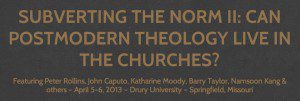I’m taking an early Spring Break this week and will be running a guest blogger series featuring some of my favorite writers. Today meet writer, speaker and pastor, the Rev. Dr. Phil Snider.
Those who follow me on Twitter can pretty much attest to the fact that I am incredibly excited about a conference I’m helping organize in April at Drury University: Subverting the Norm 2: Can Postmodern Theology Live in the Churches?
Not only does it feature a wonderfully diverse array of speakers (and is way inexpensive
as conferences go), but, more importantly, it engages the questions that I believe are essential for progressive churches in North America to consider:
- Can the actually existing churches speak meaningfully and persuasively to those who aren’t so sure about the supernatural or the magical or the metaphysical, which includes the fastest growing religious demographic in North America, the “nones,” those with no formal religious affiliation?
- Can the church retain a viable role in a world where God is often viewed as a relic of the past, or as a grand Santa Claus in the sky, or perhaps even as a narcotic or neurosis that we’d do well to get rid of?
- And if the churches are to be faithful to the revolutionary event that gave birth to Christianity, or if they are to recover their theological voice in a compelling and transformative way, is it possible to do so by listening to voices on the margins of the church, or outside of the church, including even those who might rightly pass for atheists? And perhaps more to the point, why are voices on the fringes of the church, or outside of the church, becoming more influential on church leaders and practitioners than the traditionally “orthodox” voices inside the churches?
As someone who works at a church that believes it’s possible to build a community that welcomes those who believe in God some of the time, or none of the time, or all of the time — and that it is love, not doctrine, that holds us together — well, you can imagine how much I am looking forward to the conversation this conference provides.
Perhaps most unique about this conference is that it entertains the relationship between radical theology and church practices, which I think moves the church forward in life-giving ways. As I argued in my book Preaching After God, progressive Christians often have difficulty coming to terms with what they mean by the word God. Progressives are rightly uncomfortable with God being referred to as some sort of supernatural Zeus-like supreme being who resides somewhere above the universe, intervening here or there to prevent a plane crash or something arbitrary like that. But when this idea of God is left behind, what is left? In other words, if progressives no longer view God as the grand puppeteer behind the scenes, or as the omnipotent, omniscient and omnipresent God of classical theology, how is the word God still meaningful, if it can be at all? Can the church’s language about God (in sermons, liturgies, and so on) be trusted?
 I believe that the response to these questions can be yes, but I am hesitant to embrace the answers generally offered in both conservative and liberal theology. Hence the reason I am drawn to radical theology, or what this conference is calling postmodern theology. And hence the reason I can’t wait to be part of the conversation.
I believe that the response to these questions can be yes, but I am hesitant to embrace the answers generally offered in both conservative and liberal theology. Hence the reason I am drawn to radical theology, or what this conference is calling postmodern theology. And hence the reason I can’t wait to be part of the conversation.
If you’d like more information about the conference, I encourage you to check out the top 10 reasons that Tony Jones gives for attending the conference or the 7 reasons that Tripp Fuller provides (including the unveiling of the Deacon-structor Ale, named in honor of the legendary radical theologian — and conference presenter — John Caputo).
I hope to see you in April!
———————–
Phil Snider is the senior minister of Brentwood Christian Church (Disciples of Christ) in Springfield, MO. His books include Preaching After God: Derrida, Caputo and the Language of Postmodern Homiletics and the award-winning Toward a Hopeful Future.












